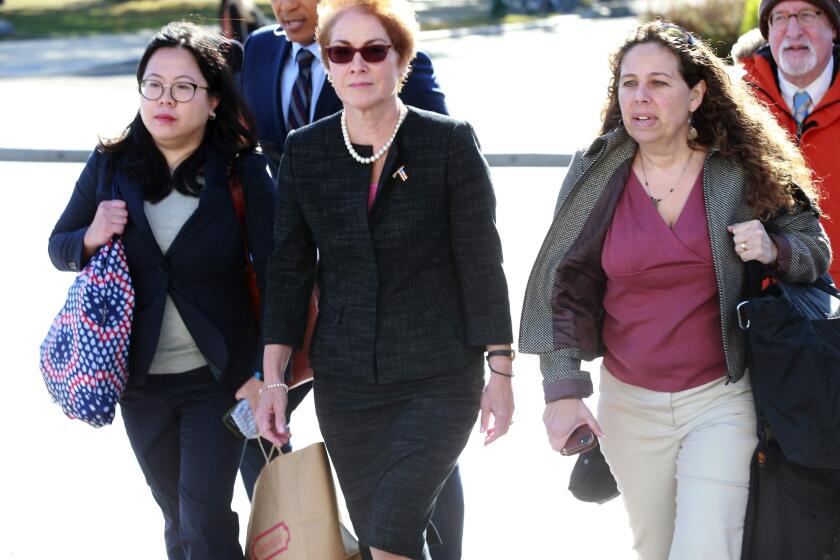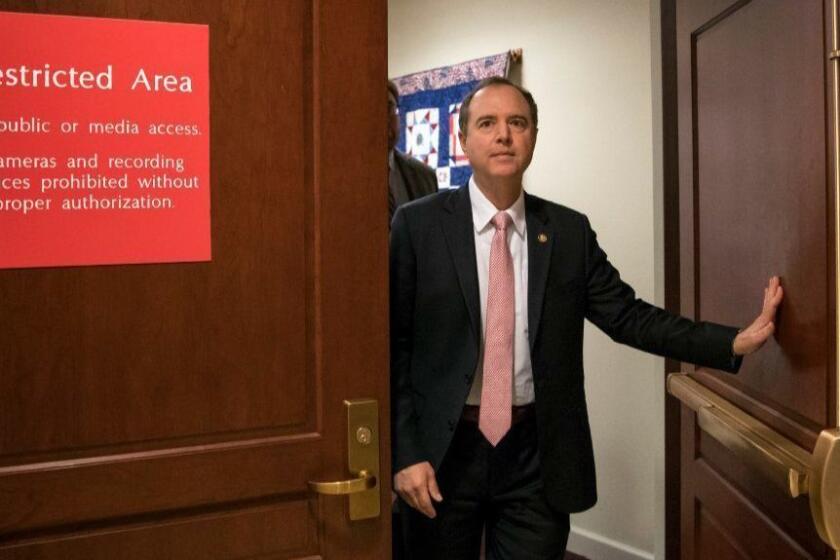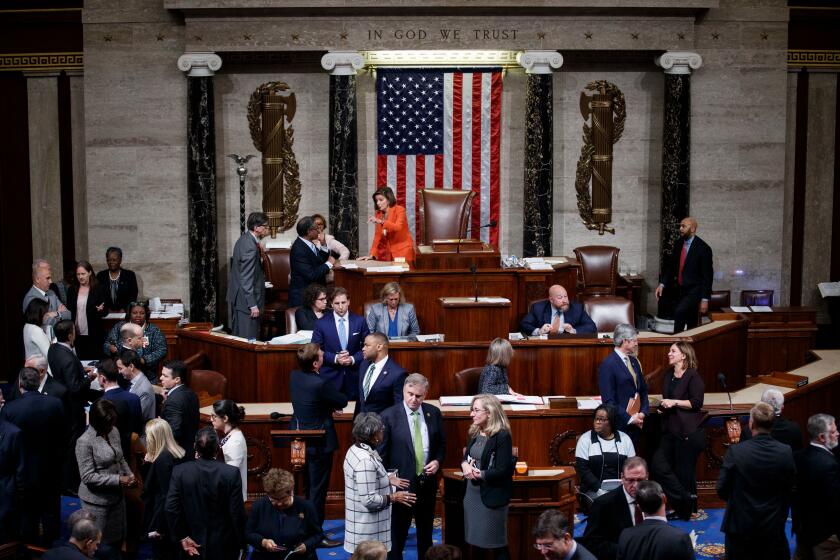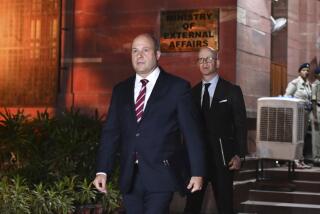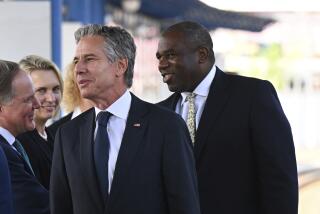William Taylor, with little green notebook and Eagle Scout style, makes for a strong witness
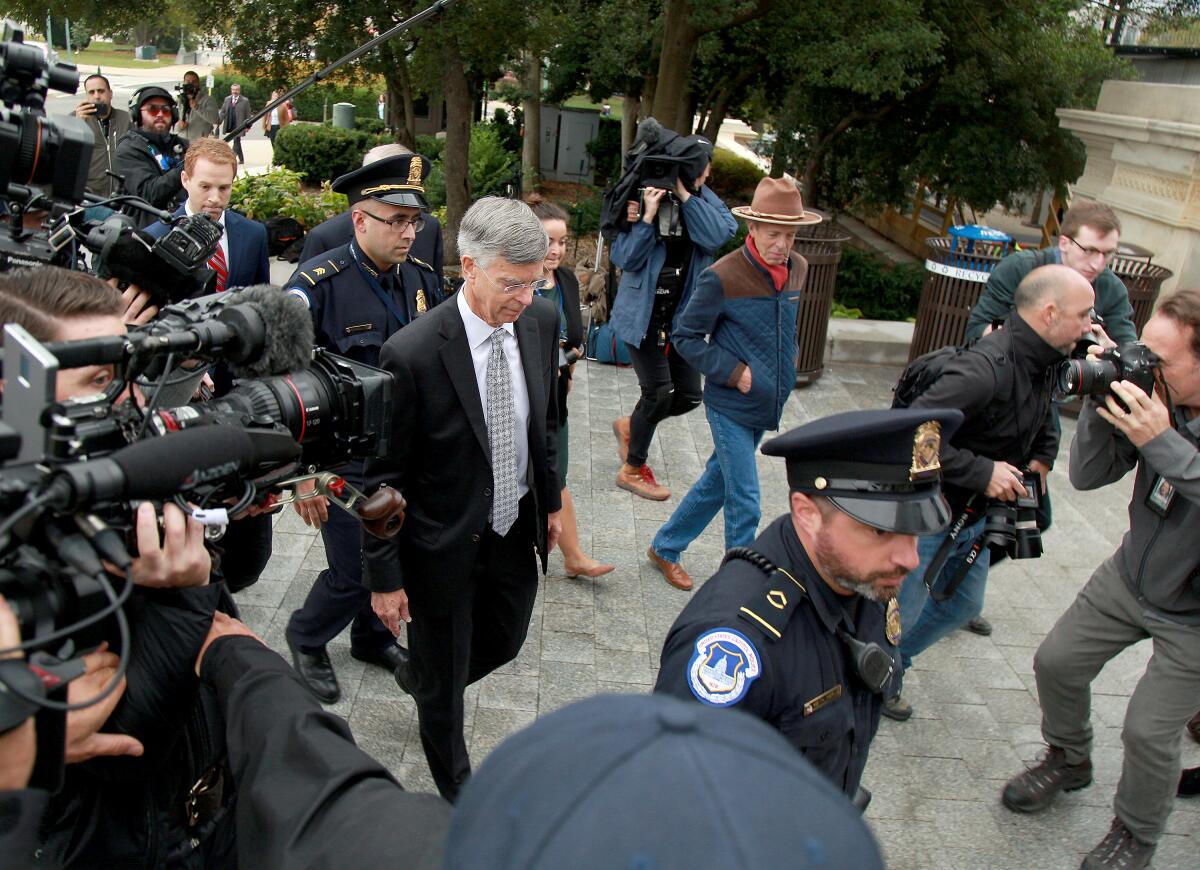
WASHINGTON — When Democrats announced last week that William B. Taylor Jr. would be their first witness in public impeachment hearings starting Wednesday, the top U.S. diplomat in Ukraine was nearly 5,000 miles away on the front lines of that country’s war with Russia, praising camouflage-clad Ukrainian troops for enforcing a nascent ceasefire.
That Taylor hasn’t given up his daily ambassadorial duties in Kyiv, even as he’s emerged as a key witness in the impeachment inquiry, is typical of the diligence and dedication long shown by the 72-year-old Vietnam vet and career public servant, friends and colleagues say.
Some were surprised that the relatively low-profile, by-the-book diplomat would be playing such a central role in the possible removal of a president. At the same time, it was Taylor’s credentials and, by all accounts, nonpartisan gravitas that gave his explosive Oct. 22 closed-door testimony such credibility.
The public impeachment inquiry hearings will start this week with testimony from three State Department officials
Taylor does not crave the spotlight, friends say, but also won’t shy away from denouncing corruption or wrongdoing, whether it’s by officials in a host country or among his own bosses.
“I don’t drop the term ‘Eagle Scout’ very often, but he absolutely is one,” said James Pettit, who served as the diplomat’s No. 2 in the U.S. Embassy in Kyiv during Taylor’s first stint there. “I don’t think he was looking for this but felt very strongly about what was going on.”
Taylor, who grew up in a Virginia military family and studied at Harvard, is seen in some quarters as a diplomat in the mold of former Secretary of State Colin Powell and his deputy, Richard Armitage — successful military commanders who became effective senior diplomats in the George W. Bush administration.
William Courtney, a former ambassador to Georgia and Kazakhstan who worked with Taylor in the 1990s airlifting medicine and other supplies into the winter-bound former Soviet Union republics, says Taylor — tall and trim with wire-rimmed glasses — exhibits the combination of “disciplined thinking” that is honed in both the military and in U.S. diplomacy.
“His judgment is tremendous,” said Courtney, who is now at the Rand Corp. “He is straightforward, honest and always with good humor. When you are around him, you not only respect him, you feel good.”
Taylor’s duty in Ukraine this year almost didn’t happen.
He retired in 2015 after nearly half a century at the State Department — working in the Middle East, Afghanistan and Eastern Europe — as well as stints at the Pentagon, Department of Energy and Capitol Hill. He’s worked in both Republican and Democratic administrations.
He was toiling away at the U.S. Institute of Peace, a government-funded nonpartisan think tank in Washington, writing essays about the need to stand up to Moscow over Ukraine and impose tougher sanctions on Russian President Vladimir Putin.
Democrats and Republicans at the public impeachment hearing will battle for the support of Americans who haven’t made up their minds about removing President Trump.
After the abrupt recall in May of Marie Yovanovitch, who had been the U.S. ambassador in Kyiv since 2016, Secretary of State Michael R. Pompeo asked Taylor to come out of retirement for a six-month tour.
Taylor had served as ambassador to Kyiv from 2006 to 2009 and, he has testified, became a passionate advocate for the former Soviet republic’s struggles domestically against endemic corruption and internationally against Russia. His wife told him not to take the job. He was concerned that the murky politics that doomed Yovanovitch were still in play.
But Taylor said he took the job after a Republican mentor counseled him that when your country calls, you comply.
“He was willing to go [to Kyiv] knowing it was a challenging but critical time,” said John Herbst, who preceded Taylor as ambassador to Ukraine and has known him for years. “He is a first-rate professional.”
Throughout his career, Taylor was rarely seen without a little green notebook, friends and colleagues recall. In it, he took meticulous notes of meetings, discussions, ideas.
“He writes everything down,” Pettit said. “He could return from a meeting I had not attended and recite back every twist and turn of the conversation.”
That attention to detail was clear in his Oct. 22 testimony, which produced startling recollections of dates, times and comments describing how the Trump administration was conducting a parallel channel of diplomacy and withholding military aid to Ukraine until new President Volodymyr Zelensky agreed to publicly announce he would investigate Trump’s political rivals.
Trump, who has tried to discredit every witness who has appeared against him, described Taylor as a “never Trumper,” a reference to those members of the GOP establishment who opposed the real estate tycoon’s presidential candidacy from the beginning. There is no evidence Taylor was a “never Trumper,” and colleagues said they never detected partisan bias in his work or professional interactions.
Pompeo has not defended Taylor against Trump’s aspersions. Both Pompeo, 55, and Taylor graduated from West Point, 17 years apart, Pompeo at the top of his class and Taylor in the No. 5 slot. Taylor served in the infantry for six years, saw combat in Vietnam with the 101st Airborne Division and earned a Bronze Star Medal.
House committees that have conducted the impeachment inquiry into President Trump behind closed doors for the last six weeks released the first two transcripts of witness testimony Monday even as four other White House officials defied subpoenas and refused to appear.
Taylor “is the whole package,” said Mark Taplin, a retired career diplomat who has crossed paths with Taylor numerous times and remains in contact with him. “Policy smarts, exceptional leadership and people skills,” he said. “At the same time, he knows how to manage resources and budgets and make things happen.”
Friends and colleagues believe the betrayal of long-held U.S. policy that upheld the strategic importance of Ukraine is what most concerned Taylor, and no one is surprised he has chosen to speak out about it.
Taylor first came to the attention of impeachment investigators because of his Sept. 9 text message to the U.S. ambassador to the European Union, Gordon Sondland, a major donor to Trump, who had taken charge of Ukraine policy.
“I think it’s crazy to withhold security assistance for help with a political campaign,” Taylor wrote. This message was one of the starkest descriptions of what Democrats now say was an abuse of presidential powers to pressure a foreign government to interfere in a U.S. election.
Taylor’s friends said the choice of the somewhat undiplomatic word “crazy” had to be intentional, perhaps a sign that Taylor suspected his objections would come to light and he hoped to establish a record.
“If he said, wrote or texted something, it was not a slip-up,” Pettit said. “He is not a loose cannon. He did it for a reason.”
More to Read
Get the L.A. Times Politics newsletter
Deeply reported insights into legislation, politics and policy from Sacramento, Washington and beyond. In your inbox three times per week.
You may occasionally receive promotional content from the Los Angeles Times.
